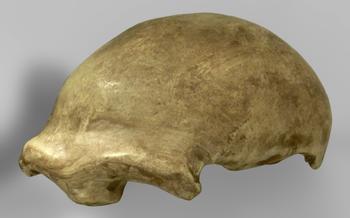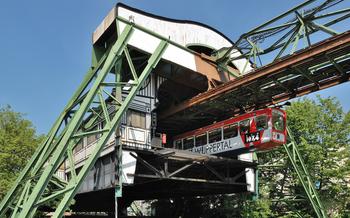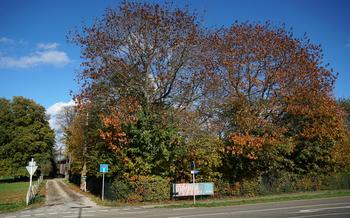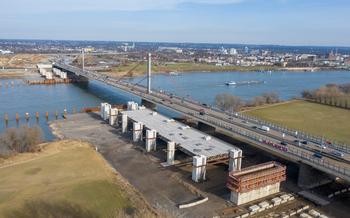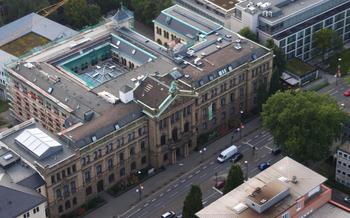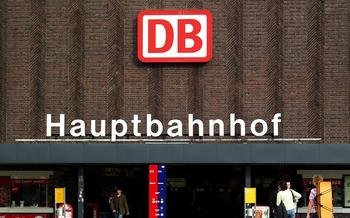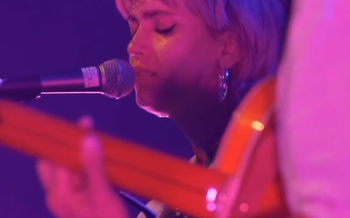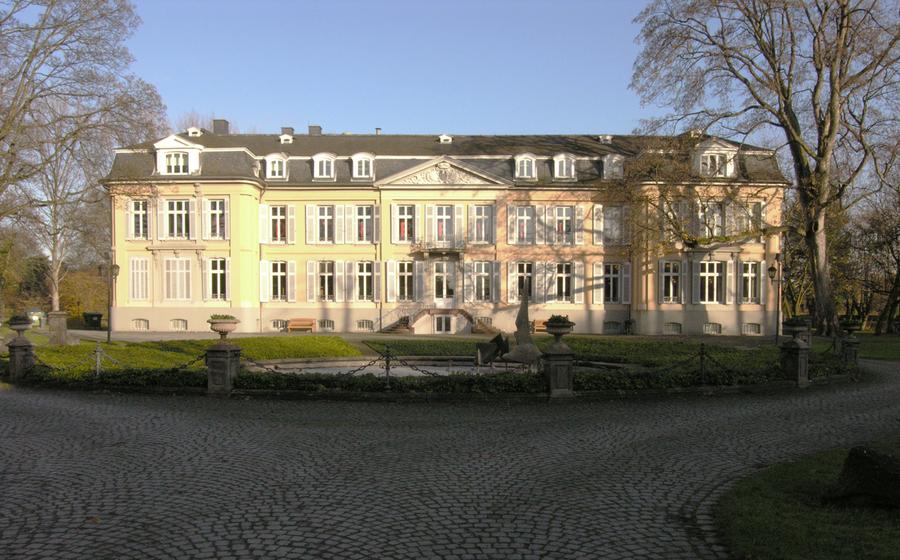
Neanderthal Museum, Mettmann
- The Neanderthal Museum
- Mettmann: A Town Steeped in History and Charm
- Neanderthal Valley Hike
- Neanderthal Man
- Neanderthal Art and Culture
- Neanderthal Extinction
- Museum Exhibits
- Guided Tours
- Educational Programs
- Special Events
- Shopping and Dining
- Transportation
- Accessibility
- Planning a Visit
- Insider Tip: Unveiling Mettmann's Hidden Gems
The Neanderthal Museum
The Neanderthal Museum, located in the picturesque Neander Valley of Germany, is a world-renowned institution dedicated to preserving and showcasing the legacy of our prehistoric ancestors, the Neanderthals. Established in 1996, the museum has quickly become a hub for scientific research, educational programs, and cultural events, attracting visitors from around the globe.
The museum houses an extensive collection of Neanderthal fossils, including the iconic Neanderthal skull that was discovered in the nearby Feldhofer Cave in 185These precious remains, along with a wealth of other artifacts, provide invaluable insights into the lives and behaviors of these ancient hominids.
Interactive displays and educational programs at the museum bring the Neanderthal story to life. Visitors can explore life-size replicas of Neanderthal habitats, learn about their hunting and gathering techniques, and even witness simulated fire-making demonstrations. Guided tours led by experienced archaeologists offer a deeper dive into the fascinating world of the Neanderthals, shedding light on their unique characteristics, cultural practices, and relationship to modern humans.
Mettmann: A Town Steeped in History and Charm
Nestled in the heart of the Bergisches Land region, Mettmann is a charming town that boasts a rich history and a vibrant cultural scene. Its origins can be traced back to the 11th century, and over the years, it has developed into a thriving municipality with a population of around 40,000.
Mettmann is adorned with numerous historical landmarks that reflect its storied past. The town hall, built in 1742, stands as a testament to the town's architectural heritage. The Alte Post (Old Post Office), dating back to 1843, is another prominent landmark that now serves as a cultural center and hosts various events throughout the year.
Beyond its historical significance, Mettmann offers a diverse range of cultural attractions. The Neanderthal Museum, situated just a few kilometers away, is a must-visit for anyone interested in human evolution and the history of our ancestors. The town also boasts several art galleries, theaters, and museums, showcasing local and international artists and providing a platform for cultural expression.
For those seeking a taste of Mettmann's culinary delights, the town offers a variety of restaurants, cafes, and bars. From traditional German cuisine to international flavors, there's something to satisfy every palate. Local specialties include Mettmanner Gulasch, a hearty beef stew, and Bergische Kaffeetafel, a traditional coffee and cake spread.
Mettmann is well-connected by public transportation, making it easily accessible from major cities in the region. The town's central location also makes it an ideal base for exploring the surrounding area, including the scenic Neanderthal Valley and the bustling city of Düsseldorf, which is just a short train ride away.
Whether you're a history buff, a culture enthusiast, or simply looking for a charming getaway, Mettmann offers a unique and rewarding experience. Immerse yourself in its rich heritage, explore its cultural attractions, and savor the local flavors to discover the essence of this vibrant town.
Neanderthal Valley Hike
The Neanderthal Valley offers a unique opportunity to immerse yourself in the footsteps of our ancestors and explore the stunning natural landscapes that shaped their lives. A network of well-marked hiking trails winds through the valley, providing a range of options for hikers of all levels.
One of the highlights of the Neanderthal Valley hike is the stunning scenery. The valley is characterized by lush forests, towering cliffs, and meandering streams, creating a picturesque backdrop for your adventure. Along the way, you'll encounter geological formations that tell the story of the Earth's history and provide a glimpse into the lives of the Neanderthals who once roamed this land.
For a more in-depth experience, consider joining a guided hike led by a knowledgeable guide. These tours offer insights into the Neanderthal culture, history, and the unique ecosystem of the valley. Guided hikes are available for groups and individuals, and can be tailored to your interests and fitness level.
If you prefer to explore at your own pace, self-guided hiking maps are available at the Neanderthal Museum and various tourist information centers. These maps provide detailed routes and information on points of interest along the way. Remember to wear comfortable shoes, bring water and snacks, and be prepared for changing weather conditions.
Whether you choose to hike with a guide or on your own, the Neanderthal Valley offers a captivating experience that combines history, nature, and adventure. Embrace the spirit of exploration and discover the secrets of this ancient landscape.
Neanderthal Man
The Neanderthals, a close relative of modern humans, emerged around 400,000 years ago in Eurasia. Their origins can be traced back to Africa, where they evolved from a common ancestor shared with Homo sapiens. Neanderthals possessed unique physical characteristics, including a robust build, prominent brow ridges, and a receding chin. Their average height was shorter than modern humans, standing at around 5 feet 5 inches.
Behaviorally, Neanderthals demonstrated advanced cognitive abilities. They crafted sophisticated stone tools, used fire for cooking and warmth, and exhibited complex social structures. Evidence suggests that they had a rich cultural life, engaging in symbolic behavior and possibly even creating art.
The relationship between Neanderthals and modern humans is a subject of ongoing research and debate. Some theories suggest that the two species interbred, resulting in the presence of Neanderthal DNA in modern human populations. Others propose that Neanderthals were eventually replaced by Homo sapiens due to competition for resources and environmental changes.
The study of Neanderthals provides valuable insights into human evolution and the diversity of our species. Ongoing research continues to shed light on their origins, behavior, and the reasons for their extinction, offering a glimpse into a chapter of human history that is both fascinating and enigmatic.
Neanderthal Art and Culture
Neanderthals, often perceived as primitive beings, exhibited remarkable artistic expressions and symbolic behavior. Although their art may not be as sophisticated as that of modern humans, their creations provide valuable insights into their culture and cognition. Neanderthals created simple yet meaningful engravings, paintings, and sculptures, often using natural materials such as bones, stones, and shells. These artistic expressions depict animals, geometric patterns, and even human figures, suggesting a level of symbolic communication and abstract thought.
One of the most intriguing aspects of Neanderthal art is their use of symbolism. They adorned themselves with jewelry made from animal teeth and shells, indicating a sense of personal ornamentation and identity. Neanderthals also engaged in ritualistic behavior, as evidenced by the discovery of intentionally arranged animal bones and artifacts in caves. These symbolic practices suggest that Neanderthals possessed a complex social and cultural life, with beliefs and traditions that went beyond mere survival.
Furthermore, Neanderthals demonstrated advanced tool-making skills, crafting specialized tools for hunting, gathering, and processing food. Their sophisticated stone tools, such as hand axes and scrapers, reveal their ability to adapt to different environments and exploit various resources. Neanderthals also mastered the use of fire, which not only provided warmth and protection but also allowed them to cook food, enhancing their diet and overall well-being.
Neanderthal Extinction
The reasons behind the extinction of Neanderthals remain shrouded in mystery, with various theories and hypotheses proposed by researchers. One widely held theory suggests that climate change played a significant role. Around 40,000 years ago, the Earth experienced dramatic climate shifts, including a period of intense cold known as the Last Glacial Maximum. These harsh conditions may have made it challenging for Neanderthals to adapt and survive.
Another hypothesis centers on competition with modern humans, who arrived in Europe during this period. Neanderthals and modern humans likely competed for resources such as food and territory, leading to conflicts and potential displacement. The superior technology and social organization of modern humans might have given them an advantage in this struggle.
Furthermore, some researchers believe that interbreeding between Neanderthals and modern humans may have contributed to their decline. Genetic studies suggest that modern humans absorbed some Neanderthal DNA, possibly through interbreeding. This interbreeding may have led to the assimilation of Neanderthals into the modern human population, resulting in a gradual loss of their distinct identity.
The extinction of Neanderthals remains a topic of ongoing research and debate. By studying Neanderthal fossils, artifacts, and genetic material, scientists continue to unravel the complex factors that led to their disappearance. Understanding the demise of Neanderthals provides valuable insights into the evolutionary history of our species and the intricate dynamics of human interactions with other hominids.
Museum Exhibits
The Neanderthal Museum houses a treasure trove of exhibits that bring the world of Neanderthals to life. The permanent exhibition, "Neanderthals: The First Europeans," takes visitors on a journey through the history, culture, and extinction of these fascinating hominids. Interactive displays, multimedia presentations, and fossil collections provide a comprehensive and engaging learning experience.
Highlights of the permanent exhibition include:
- A replica of the famous Neanderthal skull, found in the Neander Valley in 185
- Detailed models and dioramas depicting Neanderthal life and environments.
- Interactive exhibits that allow visitors to touch, smell, and hear the world of Neanderthals.
- A collection of original Neanderthal fossils, tools, and weapons.
- A section dedicated to the ongoing research on Neanderthals and their relationship to modern humans.
In addition to the permanent exhibition, the Neanderthal Museum also hosts temporary exhibitions on various aspects of Neanderthal history and culture. These exhibitions often feature new discoveries, research findings, and collaborations with other museums and institutions.
Guided Tours
Embark on a journey through time as you delve into the fascinating world of Neanderthals with the guidance of experienced experts. Guided tours at the Neanderthal Museum offer an unparalleled opportunity to gain in-depth insights into the lives, culture, and enigmatic disappearance of these ancient ancestors.
Knowledgeable guides, armed with the latest research and discoveries, bring the Neanderthal story to life, unraveling their complex social structures, hunting techniques, and artistic expressions. They will captivate you with tales of their daily struggles, their triumphs, and their eventual demise, shedding light on the mysteries that surround these enigmatic beings.
Whether you are a history buff, a curious explorer, or simply seeking an enriching experience, a guided tour is the perfect way to unlock the secrets of the Neanderthals. Tailored to diverse interests and age groups, these tours offer a personalized and engaging experience that will leave an indelible mark on your memory.
Educational Programs
The Neanderthal Museum offers a wide range of educational programs to cater to diverse audiences. Students of all ages, researchers, and the general public can benefit from these initiatives, which aim to disseminate scientific knowledge and foster a deeper understanding of Neanderthals and their significance.
Workshops, lectures, and interactive programs are regularly organized to engage participants in hands-on learning experiences. These sessions provide opportunities to delve into the latest research findings, explore Neanderthal culture and behavior, and gain insights into the processes of human evolution.
The museum also collaborates with schools and educational institutions to develop tailored programs that align with specific curricula. These programs often involve guided tours, interactive exhibits, and hands-on activities that make learning about Neanderthals both enjoyable and educational.
In addition, the museum's outreach programs extend beyond its walls, reaching communities and engaging with a broader audience. Through partnerships with local organizations, the museum organizes workshops, exhibitions, and public lectures that bring the fascinating world of Neanderthals to the forefront of public discourse.
Overall, the Neanderthal Museum's educational programs create a dynamic and engaging learning environment, promoting scientific knowledge and fostering a sense of wonder and curiosity among visitors of all ages.
Special Events
The Neanderthal Museum is not just a place of historical and scientific exploration; it also hosts a variety of cultural events, festivals, and workshops throughout the year. These special events aim to create a vibrant and engaging museum experience for visitors of all ages.
From concerts and performances to themed exhibitions and family-friendly workshops, the Neanderthal Museum offers a diverse range of events that cater to different interests. These events provide an opportunity for visitors to delve deeper into the world of Neanderthals, explore their culture and history, and engage with the museum's experts and researchers.
Some of the popular events held at the museum include the annual Neanderthal Festival, which celebrates the region's rich cultural heritage through music, dance, and traditional crafts. The museum also hosts regular lectures, workshops, and guided tours led by experienced archaeologists and anthropologists, offering visitors a unique opportunity to learn about the latest research and discoveries in the field of Neanderthal studies.
By participating in these special events, visitors can gain a deeper understanding of Neanderthal life, immerse themselves in the culture of the region, and create lasting memories of their visit to the Neanderthal Museum. It's a great way to make your museum experience truly unique and memorable.
Shopping and Dining
After a fascinating journey through the world of Neanderthals, it's time to explore the culinary delights and shopping opportunities that Mettmann has to offer. Just steps away from the Neanderthal Museum, you'll find a diverse array of restaurants, cafes, and souvenir shops to satisfy your cravings.
For a quick bite or a refreshing drink, stop by one of the cozy cafes lining the charming streets. Indulge in freshly baked pastries, aromatic coffee, or a thirst-quenching lemonade while soaking in the vibrant atmosphere.
If you prefer a more substantial meal, Mettmann has plenty of restaurants to choose from. From traditional German cuisine to international flavors, there's something to suit every palate. Sample hearty schnitzel with potato dumplings, savor authentic Italian pasta dishes, or try exotic Asian specialties.
Don't forget to pick up some souvenirs to remember your visit to the Neanderthal Museum. The museum shop offers a wide selection of books, replicas, and unique gifts related to Neanderthals and human evolution. You'll also find local handicrafts, artwork, and regional specialties in the charming boutiques and shops scattered throughout the town.
For a delightful picnic experience, head to the nearby Neanderthal Valley. Pack a basket filled with local delicacies and find a scenic spot along the river or in the forest. Enjoy a leisurely meal surrounded by the beauty of nature.
Transportation
Getting to the Neanderthal Museum is a breeze thanks to the excellent public transportation system in Germany. Buses and trains connect the museum to major cities and towns in the region, making it easily accessible for visitors from all over. The museum also provides ample parking facilities for those who prefer to drive.
For those arriving by train, the nearest station is Mettmann-Zentrum, which is just a short walk from the museum. From there, you can follow the signs or use the handy map provided on the museum's website to find your way.
If you're coming by bus, there are several lines that stop near the museum. The 742, 743, and 745 buses all have stops within walking distance of the entrance. You can check the bus schedules online or at the bus stops themselves to plan your journey.
For those driving, there is a large parking lot right next to the museum. The parking fees are reasonable, and there are plenty of spaces available, even during peak season.
No matter how you choose to get there, getting to the Neanderthal Museum is easy and convenient. So, plan your visit, hop on a train or bus, or hit the road, and immerse yourself in the fascinating world of Neanderthals!
Accessibility
The Neanderthal Museum is committed to providing an inclusive and welcoming environment for all visitors, regardless of their abilities or disabilities. Wheelchair-accessible routes and facilities are available throughout the museum, ensuring that everyone can navigate the exhibits and enjoy the experience. Audio guides are available in multiple languages, and sign language interpretation is offered for guided tours upon request. The museum staff is also trained to assist visitors with disabilities, providing support and guidance as needed. By prioritizing accessibility, the Neanderthal Museum ensures that everyone has the opportunity to learn about and appreciate the fascinating history of our ancestors.
Planning a Visit
To make the most of your visit to the Neanderthal Museum, careful planning is key. Allocate at least half a day to thoroughly explore the exhibits, participate in interactive displays, and immerse yourself in the museum's educational offerings. Advance booking is recommended, especially during peak tourist season or for guided tours.
Plan your itinerary strategically to avoid crowds. Consider arriving early in the morning or later in the afternoon to beat the rush. If you're visiting with children, plan breaks and incorporate hands-on activities to keep them engaged.
Don't forget to check the museum's website for any special events, workshops, or lectures that align with your interests. These events offer a unique opportunity to delve deeper into Neanderthal history and culture.
To enhance your experience, consider dining at one of the local restaurants near the museum. Many offer traditional German cuisine, providing a taste of the region's culinary heritage.
Finally, remember to dress comfortably as you'll be doing a fair amount of walking. Bring your camera to capture the captivating exhibits and stunning surroundings. With a little planning, your visit to the Neanderthal Museum promises to be an unforgettable and enriching experience.
Insider Tip: Unveiling Mettmann's Hidden Gems
Beyond the Neanderthal Museum, Mettmann offers a treasure trove of hidden gems waiting to be discovered. For those seeking a unique and off-the-beaten-path experience, here are some insider recommendations:
-
Haus am Quall: Nestled amidst picturesque surroundings, this charming villa hosts art exhibitions, cultural events, and workshops. Immerse yourself in the world of local and international artists while enjoying the serene atmosphere of the park-like grounds.
-
Neanderthal Panorama: Step into the shoes of a Neanderthal hunter and experience life in the Ice Age through this captivating 360-degree panorama. Transport yourself back in time and witness the daily struggles and triumphs of our ancient ancestors.
-
City Forest Gruiten: Escape the urban hustle and bustle in this sprawling forest, perfect for hiking, biking, or simply reconnecting with nature. Explore the scenic trails, marvel at the towering trees, and discover hidden ponds and meadows.
-
Old Town Mettmann: Wander through the cobblestone streets of Mettmann's historic center, lined with colorful half-timbered houses and charming boutiques. Soak in the medieval ambiance and uncover the town's rich history through its preserved landmarks and monuments.
-
Local Cuisine: Indulge in the culinary delights of Mettmann by sampling regional specialties at local restaurants. From hearty German fare to international cuisine, there's something to satisfy every palate. Don't miss the chance to try local favorites like "Mettmanner Krüstchen" or "Rheinischer Sauerbraten."
These hidden gems offer a glimpse into the authentic charm of Mettmann, providing a unique and memorable experience that goes beyond the Neanderthal Museum. Embrace your inner explorer and uncover the hidden treasures that await in this vibrant town.
